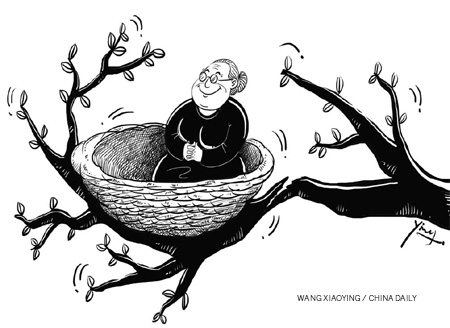But China has reached a turning point. Demographic conditions are becoming unfavorable as the "baby bust" generation comes of age - entering and progressing through the working ages.
Currently, the "baby bust" is pushing down the number of people in their early 20s. In another 10 years, the number of people in the 20s and early 30s will be in decline. With each passing year, a larger share of the labor force, too, will be in decline.
The aging population is growing and will continue to grow very rapidly. The speed of aging will depend primarily on whether the fertility rate recovers from its currently low level or declines further as has been the case in South Korea and Japan. If China's total fertility rate begins to recover from its current level of about 1.5 to 1.6 births per woman, about 34 percent of its population will be 60 years or older in 2050. But if the total fertility rate declines to lower levels, about 39 percent of its population will be 60 years or older by then.
During the last few years a group of Chinese scholars, led by Li Ling, a professor at Peking University, has been collaborating with researchers at the East-West Center and the University of California, Berkeley, to assess whether countries around the world are prepared for the aging of their populations.
How does China compare? First, aging is beginning in China when its per capita income is much lower than in rich countries. And because China is a relatively new market-based economy, many of its institutions and systems that will be increasingly important are not fully developed. Of particular note are China's rural health and pension systems.
Second, China has one of the highest saving rates in the world but the accumulated wealth may not fund the retirement needs of the elderly, who currently rely little on personal assets to fund their old-age needs.
Third, financial support for the elderly from their adult children is modest in China. Taking other East Asian countries as an indicator, the economic importance of the family system is likely to decline further as China becomes wealthier.
Hence, providing for the economic security and prosperity of its aging population will be an enormous challenge for China, particularly if the fertility rate continues to decline.
The author is a professor of economics at the University of Hawaii and senior fellow at the East-West Center.

(China Daily 06/01/2011 page9)